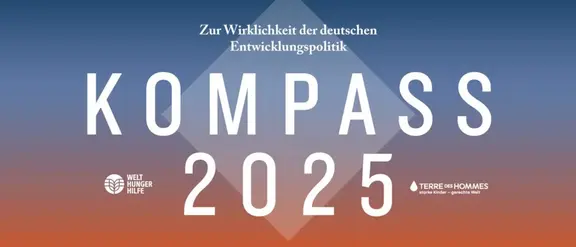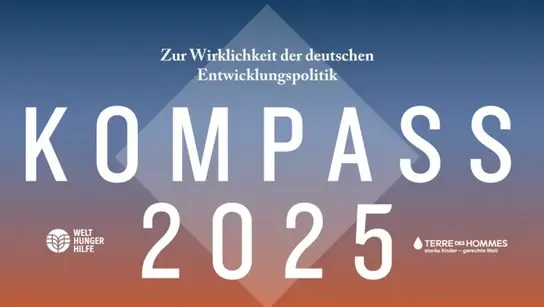Development cooperation and humanitarian aid need a new direction and stable financing
Compass 2025 by Terre des Hommes and Welthungerhilfe
Terre des Hommes and Welthungerhilfe have published their Compass 2025, analyzing German development policy. They conclude that development cooperation and humanitarian aid are facing significant upheavals and changes. Despite great needs, funding for humanitarian aid and the fight against poverty and hunger was drastically cut last year. Furthermore, increasingly critical debates are emerging about the purpose and effectiveness of development cooperation. The German government should understand international cooperation as a driver for joint solutions – in the interest of both the Global South and the Global North.
“Food security and rural development must be given greater priority, with a particular focus on the poorest developing countries (LDCs). In countries like Afghanistan, Burundi, and Liberia, hunger and poverty are especially high, and development aid is crucial for expanding social safety nets. The coalition agreement lacks a clear commitment to supporting these countries. Germany should also actively support the African Union's new initiatives to support and transform food systems and strengthen the crucial role of local non-governmental organizations by ensuring reliable access to funding,” emphasizes Mathias Mogge, Secretary General of Welthungerhilfe.
“In 2024, for the first time in five years, Germany failed to meet the internationally agreed target of 0.7 percent of its gross national income for development cooperation. The upcoming federal budget is slated to allocate even less funding for development cooperation and humanitarian aid. This would be a disastrous step for millions of children and families whose survival depends on medical care or access to food,” explains Joshua Hofert, spokesperson for the board of Terre des Hommes . “This particularly affects children living in poverty and crisis zones. Nearly 500 million children experience the consequences of wars and armed conflicts daily, and 85 million of them do not attend school. Child malnutrition is increasing significantly, and child marriage and the recruitment of children by criminal organizations are on the rise. Extensive investments in peacebuilding, humanitarian aid, and development cooperation are urgently needed.”
Compass 2025 - order or download
The Compass 2025 - On the reality of German development policy, available as a PDF download or as a brochure by post
Order or download nowDownload the graphics
-------------------------------------
The "Compass 2025" is a further development of the annual report on the "Reality of Development Policy" published by Terre des Hommes and Welthungerhilfe since 1993. It continues to subject German development policy to critical analysis, but in particular takes into account the requirements of the UN Agenda for Sustainable Development adopted in 2015 for German policy.
------------------------------------------------------------------------------------------
World Welthungerhilfe is one of the largest private aid organizations in Germany; politically and religiously independent. It is courageously and resolutely committed to a world without hunger. Since its founding on December 14, 1962, it has supported 12,128 international projects in approximately 72 countries with €5.07 billion. Welthungerhilfe operates according to the fundamental principle of helping people to help themselves: from rapid disaster relief and reconstruction to long-term development cooperation projects with national and international partner organizations.
Terre des Hommes – Strong Children – A Just World.
Our name, " Terre des Hommes ," stands for "Earth of Humanity." Climate change, child labor, war, and displacement – we empower children and young people and protect them from violence and exploitation through our projects. We provide humanitarian aid and improve the living conditions of children worldwide. What is particularly important to us is that we work with partner organizations on the ground and, together with children, enforce their rights. As a children's rights organization, we are independent of governments, businesses, religious communities, and political parties. We support approximately 400 projects for children and young people in 47 countries.


